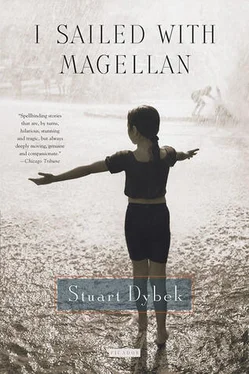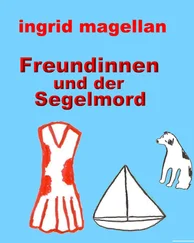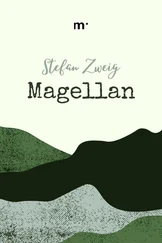That phrase was as far as I got in writing my father’s story, because it occurred to me that if the story was read aloud in class, it would be as embarrassing as shopping for a tree with my father. Worse, each sentence I wrote about the shopping seemed to take me further away from the story as my father told it, and I knew why I was disgressing, treating it as a joke: his story about meeting Teddy Kanik one Christmas Eve so long ago depressed me. It seemed to have happened in a different world — the Chicago where my father had grown up as an immigrant, only blocks away but in an alternative universe, one forever sunk in a Great Depression. That wasn’t a feeling I wanted to bring into a class where I had a reputation to uphold as a clown. I thought about Camille confiding that she’d written stories she kept secret, and realized my father’s story was better kept a secret, too.
By now it was late. I probably would have given up if all I’d wanted was to impress Camille, but writing a story was the only way I could imagine communicating with her. Despite what Sister Lucy had said about simply writing about the meaning of Christmas, I didn’t seem able to concentrate on a story dedicated to Ralphie if he wasn’t in it, so I tried writing about the funeral.
I hadn’t ridden in the line of cars that left for the cemetery after Ralphie’s requiem mass, but I’d stood on the church steps and watched the confusion of spinning tires and men in dark topcoats rocking a hearse piled with snow and flowers out of a rut along the curb. Then, the taillights of the cortege slowly disappeared down Washtenaw into a whiteout. I envisioned their headlights burrowing through the blizzard as they followed the hearse up Milwaukee Avenue, way out to the Northwest Side, where I imagined the snow was even deeper. I’d heard how, when they finally reached St. Adalbert Cemetery, they had trouble finding the grave site. In my story, the drifts were so deep that all but the crosses of the tallest monuments were buried. In that expanse of white, it was impossible to find Ralphie’s plot, but as the procession of cars wound along a plowed road, they came to a place I described as “an oasis of green in a Sahara of snow.” There, gaping from exposed grass, was a freshly dug grave. At my grandfather Mike’s funeral I’d noticed a robin with a worm in its beak fly from his open grave, so in my story birds — robins, doves, seagulls — flew out of the hole as if a cage door had opened, and circled cawing overhead. When I reread that sentence, I scratched out “robins” and wrote in “blue jays.” Only after the graveside service did snow drift over Ralphie’s plot, which was marked — as I’d heard it actually was — with a simple gray stone that made no mention of his being a blue boy. But in my story, when the snow melted in spring, his gravestone had turned blue. I tried different shades: turquoise, cornflower, Prussian, all the blues in a giant 104 box of Crayolas. None seemed right.
It was long past my bedtime. Mick had gone to sleep in the room we shared, where I’d been writing cross-legged on my bed, so I’d relocated to the kitchen table. My father looked in on me before he turned in, obviously amazed to see me slaving over homework.
“Don’t burn that midnight oil too late, sonnyboy,” he cautioned.
Quiet in our flat was when the motor of the refrigerator grew audible. I could hear its hum, and the toilet trickling, the crinkle of cooling radiators and, from down the hall, a harmonica, maybe Shakey Horton or Junior Wells still faintly playing on the bedroom radio tuned to the black rhythm and blues station that Mick and I listened to on the sly before we went to sleep.
“I’m going down to the basement and put my blue light on,” Sam Evans, the DJ, would announce at midnight.
What blue was that gravestone emerging from the dirty snow in spring? As blue as the blue light in Sam Evans’s basement? The ghostly blue of Blue Island rising from the lake? Or the cold blue of the lake itself? Norky once described it as “turn-your-balls-blue” in an oral presentation. For a time after that we referred to Lake Michigan as Lake Blueballs.
It had actually offended Camille. “Sometimes people look but don’t see what’s beautiful all around us, like the lake,” she wrote in To Change the World . “It’s a melted glacier, an Ice Age turned to sweet water. I love its taste.”
I slipped my jacket on and went out the back way and walked down the alley that led to an Ice Age so fierce the air felt crystallized, as if the snow tailing off the roofs might be flecks of frozen oxygen. It took a conscious effort to inhale its sharpness, yet instead of cursing the cold, I had a thought that maybe the purpose of winter was to make you realize with every breath that you were alive and wanted to stay that way. I thought about Ralphie and the other kids I knew who already were dead, some from accidents, some, like Peanuts Bizzaro, murdered. Peanuts had seemed indestructible. In winter, we’d all go to watch him fight at the steamy Boys’ Club gym. He was a boxer who’d prided himself on not getting hit. He made boxing something daringly beautiful, like diving off a high board. One night I stood in an audience of guys outside the Cyclone fence surrounding the warehouse lot on Rockwell — a lot with floodlights mounted too high to bust with rocks — where Peanuts was dancing, jabbing, throwing combinations, and repeating, “I’m fast, I’m flashy,” though under those lights and the bluish shadows they threw he appeared to move in slow motion as he methodically beat the piss out of a much beefier kid from the Ambros. The kid, called Dropout by the gang buddies cheering him on, had wanted to box at the Boys’ Club, but he was obviously heavier than Peanuts’s welterweight class, and when the boxing coach refused to let them put the gloves on, Peanuts offered to take it outside. Dropout wasn’t even trying to box anymore. He was grabbing and kicking, and Peanuts was nicking him with his fists, calm and cool as a matador, asking, “Am I fast or what?” Then, from outside the fence, came a single pop that echoed off the stacks of oil drums. Guard still up, Peanuts went down to one knee. Dropout kicked him over, then scaled the fence and took off with his buddies.
Peanuts tried to climb the fence but slid back. Out of nowhere, his older brother, Tony, came running and nearly cleared the eight-foot fence in a jump. He wrapped his Levi’s jacket around Peanuts, who was shivering, turning blue under the lighting, and repeating, “No fair, no fucken fair.”
Ralphie never had a fighting chance. I thought of him, and of Peanuts, of Gino Folloni and the others all buried under earth frozen too hard to break with a spade. They couldn’t feel the cold because they were the cold. Maybe they could hear the wind, but they couldn’t see how even colder than earth the boulder of moon looked through the flocked branches of back yard trees. I stopped, made a snowball, hurled it, and the snow knocked from the tree maintained the shape of branches in midair for a moment before disintegrating. I wasn’t wearing gloves, and my hands burned numb. Suddenly, I felt choked up, and I started to run as if I could outrun the feeling — which, in fact, was what I did, sprinting down three blocks of alleys without stopping to check the cross streets for traffic, but there weren’t any cars and finally, when my nostrils and lungs felt at once frostbitten and on fire and I could no longer remember why I was running or if there even was a reason, I stopped and turned around, jogging home under streetlights that looked as if they, too, should have been exhaling steam.
The kitchen was filled with a dizzying warmth. It would have felt warm if the only sources of heat were the overhead light and the humming refrigerator motor. There, on the gray Formica table, lay my smeary blue ballpoint pen and three-holed loose-leaf papers, my story, and the scratch paper on which I’d listed various kinds of blue. I tried to reread my story and couldn’t. The only thing left to make it feel right was to compress it in both hands like a snowball before throwing it into the trash bag under the sink.
Читать дальше












